Stream from crude oil Russian and Iranian trade to China has slowed due to US sanctions on Russia and the Chinese port of Rizhao, Tehran’s main importer. This is the first impact of Trump’s move to regain geopolitical control of the black gold, but according to Bloomberg, it could also be an accident: several emerging alternative solutions could ensure that this slowdown is only temporary. What tricks does China use to circumvent US sanctions?
Chaos in private companies
China is in deep trouble: It has suspended purchases of Russian crude oil, the main import from Moscow by state-owned refineries, following sanctions on Russian companies Rosneft and PJSC. In fact, Beijing was sanctioned by the US precisely because of large inflows from Moscow and private refinery Shandong Yulong Petrochemical Co., an important Russian buyer, was sanctioned and blacklisted by the West. Now, even other private companies, while generally less sensitive to these actions, have started to take action for fear of being targeted by Trump.
The market is unstable
Inflows are at their lowest point in 17 weeks. According to Rystad Energy US analysis, estimates are that China could reduce exports by 500,000-800,000 barrels per day in November: a reduction of two-thirds compared to normal levels. The Chinese market is very volatile. Private refinery owners are apparently trying by all means to get rid of Russian barrels, thereby lowering oil prices, but they remain unsold.
Russia loses economic input
Bloomberg reports interesting testimony from Vandana Hari, founder of Singapore-based analytics company Vanda Insights, who states that the latest US steps actually make a difference compared to previous ones: «US sanctions on Rosneft and Lukoil could change things a little”, she said. The consequence, even in the short term, is reduced economic inflows to Moscow. Trump’s strategy to reduce the revenues used to finance the invasion of Ukraine, for the first time, is proving to be paying off.
Iranian barrels stuck in China Sea
Exacerbating an already critical situation are the recent US sanctions against the port of Rizhao, an oil terminal that receives a tenth of crude oil imports, but this time due to ties with Iran. Trump has actually also activated a number of sanctions against imports from the Persian Gulf. Chinese demand is also lower for Iranian oil and blocked stocks are the highest since May 2023: at the end of last week there were almost 48 million barrels stored at sea, according to Kpler, between the Singapore Strait, the Yellow Sea and the South China Sea. Prices have fallen drastically, but China is afraid of bringing home Tehran’s crude, as well as Moscow’s crude.
The trick: Russia
However, this situation could be temporary if China decides to employ some tricks to evade US sanctions or face them head-on. Some ports, already on the West’s blacklist, such as Dongjiakou in Shandong province, are particularly resilient and imports from Russia could be diverted to these ports. A fact that could lead to the resumption of river flows without effective control (or stricter sanctions). In fact, Dongjiakou, after a period of stalemate, resumed the flow of funds, also from Tehran.
The trick: Iran
But on the Iranian side, the problem could be more complex: the market price of crude oil, so attractive, could stimulate the inventiveness of Chinese refineries which, in order to reactivate its ports, could consider deactivating transponders or offloading shipments, carrying out ship-to-ship transfers and thus concealing the origin of the purchases. China must evaluate whether the opportunities still outweigh the costs and decide whether to take the risk of confronting the United States in this way.
© ALL RIGHTS RESERVED



